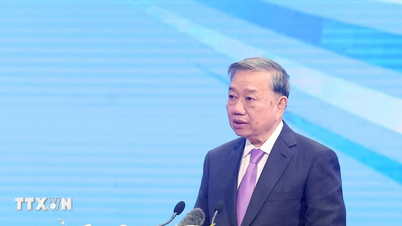
In the context of the civil judgment enforcement sector constantly improving the quality of operations and modernizing management methods, the application of the Electronic Receipt system is considered a key solution, marking an important step forward in the application of digital technology and artificial intelligence (AI) in the field of civil judgment enforcement.
The Electronic Receipt System is one of the important subsystems of the Civil Judgment Enforcement Digital Platform - a centralized digital platform for leaders, civil judgment enforcement officers, people and businesses, being deployed by the Civil Judgment Enforcement Management Department, Ministry of Justice .
In particular, the deployment of this system is a concrete step to implement Resolution No. 18-NQ/TW of the 12th Central Executive Committee, towards a streamlined apparatus that operates effectively and efficiently.
By minimizing manual operations, shortening processing time, limiting errors and enhancing centralized management, the system not only improves operational efficiency and streamlines the operating apparatus, but also creates the foundation for a modern, professional judicial administration, serving people and businesses more quickly and transparently.
According to Mr. Nguyen Thang Loi, Director of the Civil Judgment Enforcement Management Department, the implementation of the Electronic Receipt System is an important step to better serve people, helping them pay money and receive judgment enforcement documents anytime, anywhere, instead of the previous form of cash collection and paper receipts.
The Electronic Receipt System contributes to enhancing transparency, speed, safety and data seamlessness in financial management of execution through the application of advanced AI technology. The system allows digitization and automation of the entire receipt creation process - from scanning documents, automatic information extraction using AI-OCR technology, approval by digital signature, to automatic receipt numbering and centralized storage.
Thanks to that, civil enforcement officers can easily manage and look up on the electronic system instead of having to manually process paper records, which causes inconvenience and high error rates, with the help of AI agents.

Citizens and businesses can also look up receipt information anytime, anywhere via the electronic portal, ensuring more transparency and convenience. For executives, the system allows for real-time data reporting, supporting quick decision making and improving management efficiency.
With the Electronic Receipt System officially put into use nationwide from this July, all payment and collection transactions are strictly controlled and reconciled on the system, ensuring compliance with the law, preventing loss and enhancing the reputation of the industry.
The system is not only a management software, but also a platform to help change the way the entire civil enforcement industry operates, towards a modern, transparent and people-centered governance model.
Previously, on June 23, the Electronic Receipt System was piloted in Ho Chi Minh City, marking an important step in digital transformation of the civil enforcement sector in one of the localities with the largest workload in the country.
In just the first week of operation in Ho Chi Minh City, the system recorded nearly 3,000 electronic receipts issued, equivalent to nearly VND 2,000 billion in revenue and payment.
In 2024, the civil enforcement system nationwide must execute more than 1 million enforcement decisions, with a total amount of over VND 500,000 billion and about 10 million paper receipts issued - numbers that further show that digital transformation is an inevitable requirement for this field.
Speaking at the announcement ceremony, Mr. Truong Gia Binh, Chairman of FPT Corporation, said that Vietnam is facing an important time and unprecedented opportunities to reorganize, renew and design the world's leading modern management systems. The Ministry of Justice plays an important national pillar role and in the new context, technology will help the Judiciary enforce the law effectively, efficiently and economically.
With the direction of the Party and the Government through the "Four Pillars" - we are doing great things. The Ministry of Justice has pioneered the plan to apply digital transformation in 2 stages: Urgent - Breakthrough and specifically the electronic receipt system was deployed at lightning speed in just 30 days.
FPT will accompany the Ministry of Justice to create changes, contributing important values to the country. This is the first step, the hinge, many challenges and important tasks ahead, we need to move towards exploiting and processing data systematically.
In the coming time, the digital platform for civil judgment enforcement, including many applications such as the Electronic Receipt system, applications supporting the decision-making of judgment enforcement using AI, processing of petitions, connecting to public service portals, etc., will continue to be promoted to help comprehensively transform the management process, improve operational efficiency and improve the quality of citizen service.
As a technology unit accompanying the solution implementation, in a lightning-fast time of only 30 days, FPT coordinated with the Civil Judgment Enforcement Management Department to develop a plan and deploy the Electronic Receipt system based on extensive experience in digitizing vertical business processes, mastering artificial intelligence (AI) technology and leading technology solutions in digitizing processes, automating, integrating approval, inspection, and decision-making processes into a seamless chain, ensuring accuracy and legal compliance.
The Electronic Receipt System has been operating seamlessly since July 1 to realize the spirit of Resolution 57-NQ/TW.
According to HUONG NGUYEN/Nhan Dan Newspaper
Link to original articleSource: https://baovanhoa.vn/nhip-song-so/bien-lai-dien-tu-ung-dung-cong-nghe-so-trong-thi-hanh-an-dan-su-149250.html


![[Photo] National Assembly Chairman Tran Thanh Man chairs the 8th Conference of full-time National Assembly deputies](https://vphoto.vietnam.vn/thumb/1200x675/vietnam/resource/IMAGE/2025/9/29/2c21459bc38d44ffaacd679ab9a0477c)
![[Photo] Many streets in Hanoi were flooded due to the effects of storm Bualoi](https://vphoto.vietnam.vn/thumb/1200x675/vietnam/resource/IMAGE/2025/9/29/18b658aa0fa2495c927ade4bbe0096df)
![[Photo] General Secretary To Lam chairs the meeting of the Central Steering Committee on preventing and combating corruption, waste and negativity](https://vphoto.vietnam.vn/thumb/1200x675/vietnam/resource/IMAGE/2025/9/29/fb2a8712315d4213a16322588c57b975)
![[Photo] General Secretary To Lam receives US Ambassador to Vietnam Marc Knapper](https://vphoto.vietnam.vn/thumb/1200x675/vietnam/resource/IMAGE/2025/9/29/c8fd0761aa184da7814aee57d87c49b3)

![[Photo] General Secretary To Lam attends the ceremony to celebrate the 80th anniversary of the post and telecommunications sector and the 66th anniversary of the science and technology sector.](https://vphoto.vietnam.vn/thumb/1200x675/vietnam/resource/IMAGE/2025/9/29/8e86b39b8fe44121a2b14a031f4cef46)






























































































Comment (0)